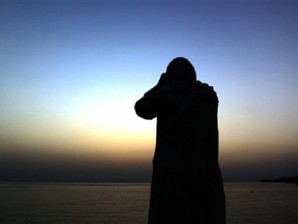Muslims from Morocco to Afghanistan brace for toughest Ramadan in years

A Bahraini man searches the sky over the Persian Gulf for the crescent moon in the western village of Karzakan, Bahrain, on Thursday, July 19, 2012. The new moon heralds the start of the Islamic holy month of Ramadan, a time of fasting, prayer and charitable giving for Muslims worldwide. Bahrain announced Ramadan officially begins Friday in the kingdom. AP/Hasan Jamali
GAZA CITY, Gaza Strip—Muslims from Morocco to Afghanistan are steeling themselves for the toughest Ramadan in more than three decades. No food or drink, not even a sip of water, for 14 hours a day during the hottest time of the year.
The test of self-restraint is made only harder by daily power cuts in some parts of the Muslim world such as Iraq, Pakistan and tiny Gaza.
With temperatures in the region routinely climbing above 40 degrees Celsius (104 Fahrenheit) and days at their longest of the year, governments are trying to alleviate the hardships of the monthlong sunrise-to-sunset fast.
Morocco resets the clock so believers can break the fast an hour early. Pakistan promises to reduce daily blackouts, which can last up to 22 hours. Public servants are allowed to work fewer hours.
Despite the hardship, for many Muslims it’s the most anticipated part of the year—a time of family togetherness and religious devotion, a break from routine. Muslims believe God revealed the first verses of their holy book, the Quran, to the Prophet Muhammad during Ramadan.
The Muslim lunar calendar moves back through the seasons, so Ramadan starts 11 days earlier each year under the Western calendar. The last time Ramadan started in mid-July was in 1980. Winter fasts are easier because of cooler temperatures and shorter days. This year, Ramadan started in most parts of the Muslim world on Friday, though some mark the beginning Saturday.
“There’s no choice but to bear the heat,” shrugged Jalal Qandil, 38, a sun-browned, sweating construction worker in Gaza City, father of five school-age children. “If I don’t work, we won’t eat this Ramadan. But God will help us.”
Other laborers said they would quietly break their fast, trusting that God understands.
“Sometimes it’s so hot, that we can’t touch the metal poles on the scaffolding without gloves,” said Munir, a 26-year-old Pakistani laborer in Dubai. “You cannot work in these conditions without water. I am religious and respect Ramadan, but it also is not intended to make you sick or put you in danger.”
Many clerics say that’s OK. Islam already gives exemptions from the fast for those in certain circumstances—the elderly, the sick, women who are pregnant, nursing or menstruating, children and travelers.
Religious authorities in the United Arab Emirates allow laborers to break their fast if the temperature exceeds 50° Celsius. Other Muslim scholars say, regardless of the temperature, laborers can break their fast if they feel weak or thirsty. They have to make up the days later, said Sheik Mohammed Ali, an Iraqi Shiite cleric.
“They should have the little food and drink that can make them able to work,” he said.
Dr. Sarmad Hamid, a physician in the Iraqi capital of Baghdad, said people should use common sense and stay out of the sun—and those who work outdoors, such as traffic police, should not be expected to fast.
Observing the fast is a particular challenge in Gaza, a tiny sliver of land between Israel and Egypt, ruled by the Islamic militant group Hamas. After years of strife and border blockades, Gaza is propped up by UN food aid and suffers daily hours-long blackouts.
Gazans have to make do without fans to cool sweltering, crowded apartments, without TVs to distract children and unemployed husbands, without ovens to cook and without water because the electric pumps are idle. As summer heat rises, some have taken to sleeping on floor tiles, the coolest part of their house.
Now, they’ll go through all that hungry and thirsty.
For many exhausted housewives, their biggest enemy will be boredom and exhaustion that erode family relations and the joy of this usually festive month.
“Frankly, men, women and children, everybody is sick of each other,” said a 52-year-old mother of 10, who would only be identified as Umm Mohammed. “Especially the men: They just sit at home and harass the children.”
Her three sisters-in-law nodded in agreement.
And yet, they said they are looking forward to the season.
For believers, Ramadan is meant to be a time of reflection and worship, abstaining from swearing, gossip and bursts of anger, remembering the hardships of others and being charitable.
In mosques across the Muslim world, volunteers will serve free evening meals for the community. Those who can afford it prepare elaborate dinners for “Iftar,” or the meal that breaks the fast. In Morocco, the sunset meal is light, consisting of a traditional spicy thick tomato soup with chickpeas, followed by milk, dates and a croissant. Several hours later, Moroccans eat a full dinner.
Tunisian economist Ridha Gouia estimated that household consumption in his country goes up 1.5 times during Ramadan. Many gain Ramadan pounds, particularly through snacking all evening on cream-and-nut stuffed fried pancakes soaked in syrup, a traditional favorite.